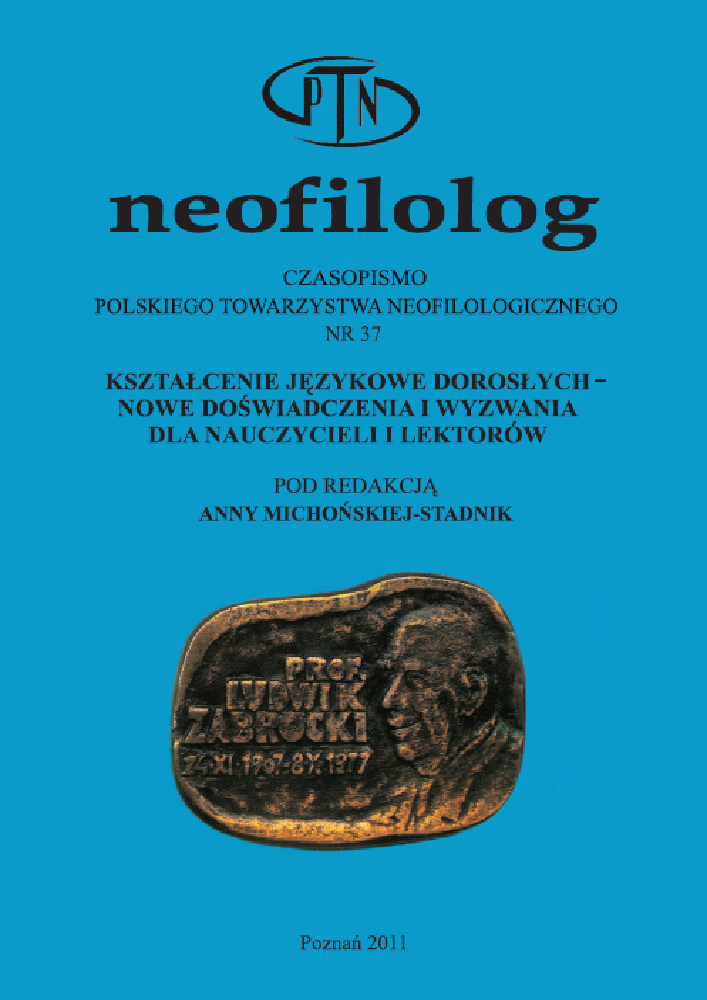Résumé
Knowing that there is a definite link between instructor – student interaction and students’ affect, as there is between affect and learning, the article pro-vides a look at the ways in which FL teachers address adult learners. Teaching adult learners in general constitutes a challenge since the group are especially sensitive to self image and easily get demotivated. Teacher’s behaviour, her attitude to the adult student and the atmosphere of learning are among the most important motivational factors for adults. The article is an attempt at presenting specific interactional strategies good teachers practice in order to motivate adults, offer them a sense of security and satisfy their face needs.
Références
Askildson, L. 2005. „Effects of humor in the language classroom. Humor as a tool in theory and Practice”. Arizona Working Papers in SLAT – Vol. 12, pp 45-61. http://w3.coh.arizona.edu/. DW: 12.03.20011.
Bye, D., Pushkar, D. i Conway, M. 2007. „Motivation, Interest, and Positive Affect in Traditional and Nontraditional Undergraduate Students”. Adult Education Quarterly, 57: 141-158.
De Andres, V. 1999. „Self-esteem in the classroom or the metamorphosis of butterflies.” (w:) Affect in language learning. (red. J. Arnold). Cambridge: Cambridge University Press.
Dörnyei, Z. 2001. Teaching and Researching Motivation. England: Pearson Education Limited.
http://ec.europa.eu/education/languages/language-teaching/doc52_pl.htm. Nauczanie języków obcych. Edukacja dorosłych. DW: 18.02.2011.
Jiang, X. 2010. „A Case Study of Teacher’s Politeness in EFL Class”. Journal of Language Teaching and Research, 5, 651-655. http://ojs.academypublisher.com. DW: 1.03.2011.
Knowles, M. S., E. F. Holton III i R. A. Swanson. 2009. Edukacja dorosłych. Wy-dawnictwo Naukowe PWN.
Komorowska, H. 2007. Metodyka nauczania języków obcych. Warszawa: Fraszka Edukacyjna.
Oxford, R. L. 1999. „Anxiety and the language learner: new insights.” (w:) Affect in language learning. (red. J. Arnold). Cambridge: Cambridge University Press: 58-67.
Pierścieniak, K. 2005. „Specyfika uczenia się dorosłych” (w:) Poradnik Edukatora (red. M. Owczarz). Warszawa: Wydawnictwo CODN: 17-28.
Rapley, T. 2010. Analiza konwersacji, dyskursu i dokumentów. Warszawa: Wydawnictwo Naukowe.
Schmitz, J. R. 2002. „Humor as a pedagogical tool in foreign language and trans-lation courses.” Humor: International Journal of Humor Research, 15-1: 89-113.
Wowro, I. 2009. „Rola treści humorystycznych w nauczaniu języka obcego. Analiza wybranych podręczników do nauki języka niemieckiego.” Neofilo-log, 33: 269-282.
Zhao, W. 2010. „An investigation of students’ face wants in Chinese English teachers’ Classroom Feedback”. Journal of Language Teaching and Research, Vol. 1, No. 1: 29-34.
Licence
© Agnieszka Strzałka 1970

Ce travail est disponible sous licence Creative Commons Attribution - Pas de Modification 4.0 International.
Auteurs :
Les auteurs de textes acceptés pour publication dans la revue Neofilolog sont tenus de remplir, signer et renvoyer à l'adresse de la rédaction, un accord sur l'octroi d'une licence gratuite pour les œuvres, avec obligation d'accorder une sous-licence CC.
En vertu de cet accord, les auteurs des textes publiés dans la revue Neofilolog accordent à l'Université Adam Mickiewicz de Poznań une licence non exclusive et gratuite et permettent l'utilisation de la sous-licence Creative Commons Attribution-NoDerivatives 4.0 International (CC BY-ND 4.0).
Les auteurs se réservent le droit de disposer librement de l'œuvre.
Utilisateurs :
Les utilisateurs d'Internet intéressés ont le droit d'utiliser les œuvres publiées à partir de l'année 2017 sous réserve des conditions suivantes :
- reconnaissance de la qualité d'auteur - l'obligation de fournir des informations sur la qualité d'auteur, le titre, la source (liens vers l'œuvre originale, DOI) et la licence, ainsi que l'œuvre distribuée ;
- sans créer d'œuvres dérivées - l'œuvre doit être conservée dans sa forme originale, p. ex. les traductions ou les interprétations ne peuvent être distribuées sans le consentement de l'auteur.
Tous les textes publiés sont soumis au droit d'auteur.
Autres :
L'Université Adam Mickiewicz de Poznań se réserve le droit à la revue dans son ensemble (mise en page, forme graphique, titre, conception de la couverture, logo, etc.).
.
